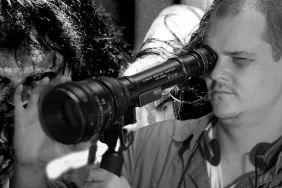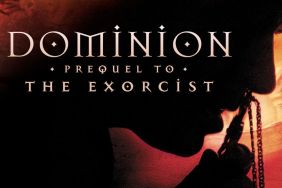Stellan Skarsgård as Father Lankester Merrin
Gabriel Mann as Father Francis
Clara Bellar as Rachel Lesno
Billy Crawford as Cheche
Ralph Brown as Sergeant Major
Israel Aduramo as Jomo
Andrew French as Chuma
Antonie Kamerling as Kessel
Julian Wadham as Major Granville
Eddie Osei as Emekwi
Ilario Bisi-Pedro as Sebituana
Niall Refoy as Corporal/Thief
Lorenzo Camporese as Private/Thief
Burt Caesar as Dr. Lamu
Marcello Santoni as Dutch Farmer
Summary:
Schrader’s version of Father Merrin’s origin looks great and shows some fine dramatic chops from Skarsgård and Mann, but that doesn’t help it rise above the fact that it’s slow, boring and not particularly scary.
Story:
Thirty years before he had to get the devil out of 11-year-old Regan McNeil in The Exorcist, Father Lankester Merrin (Stellan Skarsgård) turned his back on faith to become an archeologist in Africa. After uncovering a long buried Byzantine church, he inadvertently unleashes evil upon a local tribe, but when the devil possesses a young native boy, Merrin must make a life-changing decision on whether to don his clerical robes again.
Analysis:
Ten years after the second sequel to William Blatty’s The Exorcist, things moved ahead on new Exorcist material with a planned prequel that was plagued with many problems from its inception. After original director John Frankenheimer fell fatally ill, Paul Schrader (Affliction, American Gigolo) took over the project, but it wasn’t deemed scary enough, so director Renny Harlin was hired to start from scratch. Rarely when something like this happens can one expect to see the original director’s vision, so it’s a bit of a surprise that Schrader was allowed to finish his film so that people could see how his differed.
Not having seen the Harlin directed prequel-and probably the better for it-there’s little to compare Dominion to except for the original movie. Schrader’s primary objective is to develop the character of Father Merrin, who played such a large part in what many consider to be greatest horror film ever. Schrader takes more of an “old school” approach than has been seen in recent horror films, but it takes a long time for the movie to resemble anything even remotely like The Exorcist. Sure, the film is visually gorgeous, particularly the way the African setting is used, but a lot of it comes across like a period character drama rather than a horror movie.
It opens years earlier in Merrin’s native Holland where he is forced by Nazi soldiers to pick ten parishioners to be executed for the death of a soldier. This incident causes Merrin to lose his religion, and the next time we see him, he’s working as an archaeologist on a dig excavating a buried church. It’s a mystery that attracts the attention of the Church who sends the young Father Francis (Gabriel Mann) to set up a missionary among the area’s primitive tribe. Meanwhile, a young crippled boy named Cheche (pop singer Billy Crawford) eyes the dig site warily, and Merrin promises to help this unfortunate boy. A Pagan temple is found buried underneath the church and when it’s breached, an ancient evil is unleashed, as bad things happen to the tribe and the army sent there to maintain order.
Although the set-up is interesting, the story moves at a snail’s pace until about an hour into it, when the devil finally makes his presence known, and we finally get a some inkling that this is related to The Exorcist. It’s a welcome change of gears from all the drama, but it’s hard to decide whether the movie gets better or worse once things start to happen. Although the excess of character development and exposition is a bit boring, it’s certainly better than where things go from there. The shift to more familiar territory might have been more welcome if things didn’t start getting unintentionally silly once Merrin starts to face the devil.
Maybe if Schrader had written this himself, it wouldn’t have been nearly so bad. After all, he penned Raging Bull and Taxi Driver for Martin Scorsese. The poor writing is counteracted by two solid dramatic performances by Skarsgård and Gabriel Mann, and in some scenes, they actually are able to rise above the weak material. They both do their best to show the inner struggle that the clergy must face when dealing with things that don’t fit into their normal views on religion and faith. Clara Bellar’s village nurse and concentration camp survivor is not quite as convincing, and the romance with Merrin seems forced.
The movie’s biggest foibles come from the CGI and green screen effects, which are amateurish at best, and laughably bad at their worst. One has to think that they were done in a rush to finish the movie, making you wonder whether Schrader decided to do them himself rather than hiring an effects team. The “deadly” hyenas that show up at the archeological dig to protect it look unbelievably fake and the effects used during the fight between Merrin and the devil are even worse. And then there are the scenes that will leave you scratching your head, like the woman who gives birth to a maggot-covered baby, an event that might be more shocking if it seemed to have any lasting effect on anyone in the tribe. It’s never mentioned again in the movie. Most of the scenes are over-scored with non-stop music from Trevor Rabin and Angelo Badalamenti. Though it does help set the mood and tone, there are times when the movie could use a break from the mostly synthesized orchestrations.
The Bottom Line:
While Dominion may have been a decent drama as its own entity, it’s not very good as a prequel to The Exorcist, primarily since it’s not very scary. If nothing else, letting people see Schrader’s original film makes it that much more apparent why they chose to go in a different direction with it. At least it’s better than some of the earlier Exorcist sequels.










